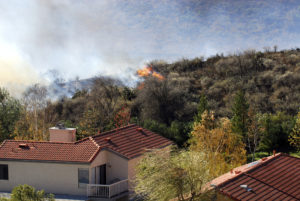Mandatory Fire Evacuation Might Be Covered 
With many residents in California and the West displaced due to Mandatory Fire Evacuations, many people do not realize that costs incurred during a mandatory fire evacuation may be covered by your homeowners insurance policy.
One might expect that temporary living expenses would be covered if your home is damaged due to a covered loss. Not as well known, however is the fact that you may not actually need to sustain a loss to your home for the coverage to kick in. Most homeowners policy will cover expenses incurred should you be forced from your home due to a mandatory fire evacuation ordered by the appropriate civil authorities.
Keep Your Receipts
It should be obvious that if you find yourself forced to flee your home due to a mandatory fire evacuation, you should keep all receipts for any hotel room that you stay att. Also, keep receipts for any other expenses you incur, for meals, personal care items, maybe even clothing or other items. It’s at this point that I should include the obligatory, cautionary legalese: The contents of this article should not be taken as gospel for what your homeowners policy will cover. There are many companies out there and they sell a variety of different policies whose policy language and coverages will differ. There are some companies that sell stripped down policies that don’t include such important benefits or would require that your home actually sustain damage. Also, you would likely be subject to the deductible that you chose.
How to Tell if You Are Covered for a Mandatory Fire Evacuation
If you have access to your policy, look for the words “Civil Authority Prohibits Use” under the section that deals with Additional Living Expense. If not, you can call your agent or call your insurance company directly.
Having this coverage at least helps take some of the stress out of being subject to a mandatory fire evacuation.
UPDATE: Fire Insurance Companies Move to Limit Evacuation Coverage
In recent years there has been movement by some companies to further limit the length of time that is covered for evacuation orders. The fires in California provide a good example of how these limitations may come in to play.
For the majority of years and the majority of fires, evacuation orders last only a few days. However, with resources stretched thin between all of the California wildfires as well as the fires in Oregon and Washington, fires that become partially contained can flare up again. In some instances, this can result in evacuation orders being lifted and then reimposed. If a policy provides a limited amount of coverage for evacuations, it is certainly conceivable that that limit could be exceeded by multiple or lengthy evacuations. Therefore it is very important to clarify with your insurance agent/company whether evacuation limits apply to each individual evacuation order or all orders arising from a particular fire.
Further, be skeptical of press releases from the governmental officials that might seem to imply that insurance companies are being ordered to provide evacuation coverage where none exists. While some might like to think that these officials have a magic wand to wave that mandates that insurance contracts expand beyond the actual coverage provided, few if any actually have that kind of power. Typically, insurance companies will continue to adhere to the language of the actual policy contract. This doesn’t mean that the companies are evil, stingy or whatnot. Insurance companies live and die by their contracts and must, by law, follow what the contract says. They really don’t have that kind of freedom.
The problem is if you live in a place that is prone to Fire, they have either canceled everyone’s insurance at one time or another, that people like us are afraid to call the insurance Companies. WE have not been canceled ever but many in our area have and I am sure if we make a claim for help in the end we probably will be canceled. Sad that they want our money and we pay every year, but making a claim can cost you big time.